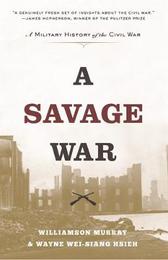
|
A Savage War: A Military History of the Civil War
Paperback / softback
Main Details
| Title |
A Savage War: A Military History of the Civil War
|
| Authors and Contributors |
By (author) Williamson Murray
|
|
By (author) Wayne Wei-siang Hsieh
|
| Physical Properties |
| Format:Paperback / softback | | Pages:616 | | Dimensions(mm): Height 235,Width 155 |
|
| Category/Genre | American civil war |
|---|
| ISBN/Barcode |
9780691181097
|
| Classifications | Dewey:973.73 |
|---|
| Audience | | General | | Tertiary Education (US: College) | | Professional & Vocational | |
|---|
|
Publishing Details |
| Publisher |
Princeton University Press
|
| Imprint |
Princeton University Press
|
| Publication Date |
29 May 2018 |
| Publication Country |
United States
|
Description
How the Civil War changed the face of war The Civil War represented a momentous change in the character of war. It combined the projection of military might across a continent on a scale never before seen with an unprecedented mass mobilization of peoples. Yet despite the revolutionizing aspects of the Civil War, its leaders faced the same uncer
Author Biography
Williamson Murray is professor emeritus of history at Ohio State University. His many books include The Iran-Iraq War. Wayne Wei-siang Hsieh is associate professor of history at the United States Naval Academy. He is the author of West Pointers and the Civil War.
Reviews"[An] illuminating, ambitious and unsentimental history. . . . Exceptionally lucid."---Fergus M. Bordewich, Wall Street Journal "[An] outstanding account of the American Civil War. . . . This expertly written narrative will draw in anyone with an interest in the Civil War at any knowledge level." * Library Journal * "A genuinely fresh, persuasive perspective on the Civil War. . . . [A Savage War] will make even readers with a strong knowledge of the war think about how it was fought and why it ended as it did. A winner for Civil War history buffs." * Kirkus * "[A] new and interesting military history of the American Civil War."---Francis P. Sempa, New York Journal of Books "The best, clearest, and most instructive military history of the Civil War I have ever read. . . . [A Savage War] hit a home run."---Tyler Cowen, Marginal Revolution "For those who want to understand the key decisions that determined the outcome of the [Civil War], the organization of the opposing armies and their deployments, the role of logistics and intelligence, and the moments of inspired generalship (and missed opportunities), it is hard to imagine a better book than this."---Lawrence D. Freedman, Foreign Affairs "Widely published and respected military historians Murray and Hsieh produce a fresh look at the U.S. Civil War. . . . An important, impressive book." * Choice * "Murray and Hsieh offer keen insights on the crossroads of social, political, and technological drivers that produced what the authors call the first modern war. . . . The mini-portraits of Abraham Lincoln, Ulysses S. Grant, Robert E. Lee, and William T. Sherman sprinkled throughout that narrative are superb, and the critiques of Jeff Davis and the hapless Henry Halleck are devastating. . . . [A] stimulating contribution to the field that will captivate readers. [A Savage War] belongs on the shelf of students of war, right next to their worn copy of McPherson's classic, Battle Cry of Freedom."---Lt. Col. F.G. Hoffman, Marine Corps Gazette "Hsieh and Murray illuminate the broader political and cultural forces that shaped the [Civil War's] course while also giving due credit to the impact of contingency and human action. . . . A Savage War will appeal to both academic and popular audiences with its resonance, accessible prose, and fresh treatment of the events that still captivate America's public consciousness over 150 years later."---Lt. Andrew L. Hargroder, Civil War Book Review "A first-rate analysis of command, command structure, and the behavior of officers and men in combat. . . . [Murray's] volume is solidly researched, well written, and deeply interpretive, and it should be read by anyone open to new perspectives on the Civil War."---John M. Belohlavek, Journal of Southern History
|